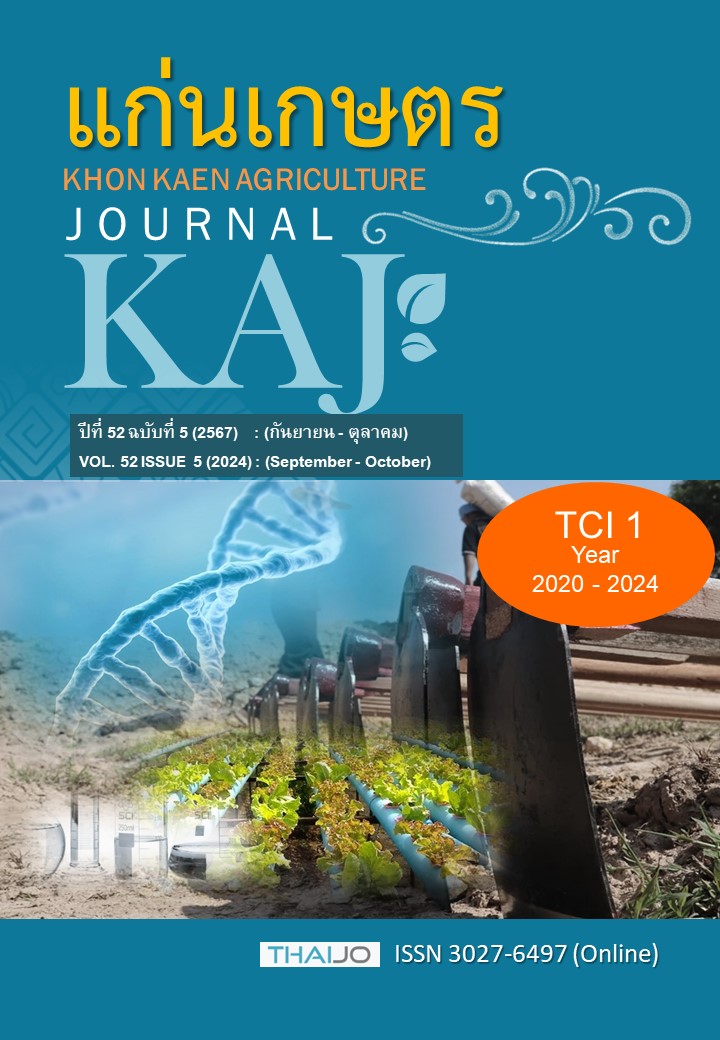Guidelines for implementing the Sufficiency Economy Philosophy (SEP) to enhance the quality of life perception among farmers in Djakotomey District, Republic of Benin
Main Article Content
บทคัดย่อ
This mixed-methods research investigated the guidelines for implementing the Sufficiency Economy Philosophy (SEP) to enhance the perception of quality of life (QoL) among farmers in Djakotomey District, Republic of Benin. Research instruments, including questionnaires, interviews, focus group discussions, and lessons learned, were utilized to collect data. Participants consisted of two groups: (1) 17 experienced farmers from the Huay Tong community, Mae Wang District, Thailand, and (2) 24 farmers from Djakotomey District, Republic of Benin, who engaged in SEP-integrated vocational and agricultural training programs facilitated by experts from the Thailand International Cooperation Agency (TICA) between 2019 and 2022. The results revealed significant (P<0.05) improvements in farmers' quality of life perceptions in both contexts. In Thailand, scores increased from 1.74±0.104 to 4.67±0.063 (out of 5), while in Republic of Benin, they increased from 1.91±0.239 to 3.97±0.300. A significant (P<0.05) correlation between QoL perception and SEP understanding was observed in both groups, as represented by the equation QoL = 1.320 + 0.663 SEP, with an r² value of 0.624. These findings indicated that participation in SEP training significantly enhanced QoL perception. The study identified key guidelines for SEP implementation, including understanding SEP principles, integrating SEP into vocational and agricultural training, promoting knowledge sharing and community empowerment, fostering financial management skills, and fostering partnerships between government and community entities.
Article Details

อนุญาตภายใต้เงื่อนไข Creative Commons Attribution-NonCommercial-NoDerivatives 4.0 International License.
เอกสารอ้างอิง
Barua, P., and P. Tejativaddhana. 2019. Impact of application of Sufficiency economy philosophy on the well‐being of Thai population: A systematic review and meta‐analysis of relevant studies. Journal of Population and Social Studies [JPSS]. 27(3): 195–219.
Bergsteiner, H., and P. Dharmapiya. 2016. Sufficiency Thinking: Thailand’s gift to an unsustainable world. pp. 1023-1343. In G. C. Avery and H. Bergsteiner (eds.). Sufficiency economy philosophy process. Allen & Unwin, Sydney.
Beslerová, S., and J. Dzuričková. 2014. Quality of life measurements in EU countries. Procedia Economics and Finance. 12: 37 – 47.
Jeerat, P., P. Kruekum, P. Sakkatat, N. Rungkawat, and S. Fongmul. 2022. Developing a model for building farmers’ beliefs in the sufficiency economy philosophy to accommodate sustainable agricultural practices in the highlands of Chiang Mai Province, Thailand. Sustainability. 15(1): 511-526.
Liao, X., T. P. L. Nguyen, and N. Sasaki. 2022. Use of the knowledge, attitude, and practice (KAP) model to examine sustainable agriculture in Thailand. Regional Sustainability. 3(1): 41-52.
Panyasing, S., S. Yongvanit, E. P. Purnomo, I. Tham, and S. Aim. 2022. The government policy on the organic rice farming groups embracing sustainable agricultural production: Evidence in Thailand. The Journal of Agrobiotechnology Management and Economics. 24 (1): 83-94.
Piyapong, J., and D. Chaweewan. 2016. Rural villagers’ quality of life improvement by economic self-reliance practices and trust in the philosophy of sufficiency economy. Societies. 6(3): 26-45.
Prabripu, P., and A. Wiboonpongse. 2020. Progressing towards a sufficiency economy in small rice farming households in northern Thailand. Applied Economics Journal. 27(2): 1-19.
Prabripu, P. 2023. Sustainability of small farming households: an outcome of their being a sufficiency economy unit. Journal of Applied Economics and Management Strategy. 10(1): 222-238.
Prayukvong, W., A. Puntasen, M. J. Foster, and K. Moopauak. 2023. The sufficiency economy philosophy as an approach to social innovation: case studies of local governments in Thailand. Innovation: The European Journal of Social Science Research. 1-18.
Promjisa, N., T. Jitbantao, and S. Mungthaisong. 2024. Strategies to apply sufficiency economy philosophy to the way of life for youth in the greater Mekong sub-region. Asia Social Issues. 17(3): 1-15.
Rogers, E. M. 2003. Diffusion of innovations. Free Press, New York.
United Nations Development Programme (UNDP). 2022. Human Development Report 2021/2022. The United Nations Development Programme, New York.
Wattanakornsiri, A., N. Pukkalanun, and H. Phimphanthavong. 2020. Sufficiency economy philosophy for community driven development approach on sustainable local development: lessons learned and success factors from sufficiency economy villages, Surin province, Thailand. Journal of Local Governance and Innovation. 4(2): 15-34.
Wongnaya, S., and T. Chaowakeeratiphong. 2013. Strategy development for village management according to living based on the sufficiency economy philosophy in Kamphaeng Phet and Tak. The Golden Teak: Humanity and Social Science Journal. 19(1): 1-12.


